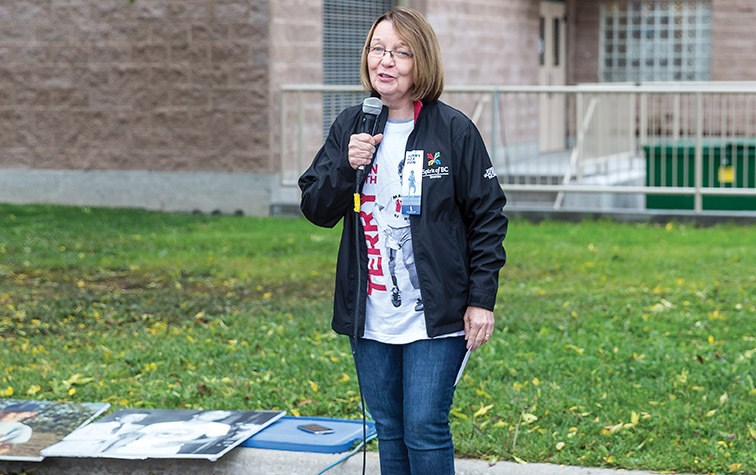As the BC Liberals begin organizing for a leadership race, the interim leader must embrace 'small 'l' liberal' values as she guides the party through a province-wide consultation to re-evaluate priorities and rebuild itself, said a former senior political advisor.
“She can't continue on with just being the federal Conservative Party-lite,” said Martyn Brown, a former advisor to three provincial Liberal leaders and chief of staff to Gordon Campbell. “As an interim leader, part of it is seeing the party through its engagement process and wrestling through this existential crisis that the party faces,”
Prince George-Valemount MLA Shirley Bond was elected interim Liberal leader by her caucus colleagues on Nov. 23 after former Liberal leader Andrew Wilkinson stepped down following poor election results. The Liberals lost about a third of the 43 seats they’d won in 2017, and the electorate delivered a majority government to the New Democrats. Shut out of Vancouver Island completely, the Liberals won only 11 seats in Vancouver and the Lower Mainland.
Bond has to embrace the values that small ‘l’ liberals hold in the more urban and sub-coastal regions, Brown said in an interview last month. “To be more respectful of the diversity of British Columbia, broadly, and really hit on the human issues, the human values, that the BC Liberal Party is supposed to represent, as vacated largely under Wilkinson and (Christy) Clark.”
The interim leader has to put the propositions out there and the questions that the party has to contemplate, he said.
“And she has to lead it,” said Brown, “inviting that debate and dialogue and leading that engagement.”
Before the dust had settled on the election results, Bond was calling the political shake-up a chance for Liberal renewal.
“This provides us with an enormous opportunity to engage with British Columbians in a meaningful way to talk about, what are the right directions? What are the things that they would like to see us do differently?” Bond said shortly after becoming interim leader.
The party hired an independent consultant to review the strengths and weaknesses of the campaign, and launched an engagement process to ask members, and the public, where the party went wrong and what the Liberals should stand for going forward.
“There are going to be some uncomfortable questions and discussions,” Bond said. But the Liberals needed to listen, learn and be willing to respond if they were going to renew and rebuild the party, she said.
“Obviously, we didn't resonate and connect well in the last election,” said Prince George business owner Cameron Stolz, one of seven members on a newly formed Liberal Leadership Election Organizing Committee.
The committee will pull together the rules governing leader candidate campaigns and the upcoming Liberal leadership race guidelines. Once the leadership election rules are drawn up, the campaign schedule—culminating in a Liberal leadership convention—will be planned. The leadership race timeline, including election date, may be announced as early as next month.
The committee will be co-chaired by Victoria lawyer Roxanne Helme and former Liberal Cabinet Minister Colin Hansen. Derek Lew, a venture capital chief executive from Vancouver, Port Moody lawyer Sarah Sidhu, and Fraser-Nicola Liberal MLA Jackie Tagart, are also on the committee.
Meanwhile, barely three months into the consultation process, the feedback is ongoing, and the party is sincere, said Stolz.
“Where is that breakdown in connection?” he asked. “Is it in our policies? Is it in our stances on certain issues? Where is the challenge that prevented people from putting a checkmark beside that BC Liberal candidate’s name?”
The results will be taken seriously, Stolz said. “There's a very definite (awareness) the party does need to change, that all of this can't just be lip service, it actually has to be a fundamental change in the party itself.”
The consultation is reaching beyond members, encompassing people who might vote Liberal next time around, said acting president of the BC Liberal Party, Don Silversides, who is also a member of the leadership committee.
“It's important that we reach out and attract a more diverse membership,” said Silversides, a practicing lawyer in Prince Rupert. “We can't satisfy everybody, but some good ideas are being put forward and we'll have to consider them very seriously and decide what the priorities are.”
At this point, no one knows what changes might be recommended or ultimately adopted by the party as a whole, only that changes will be made, Silversides said.
Input from the consultation, along with the debriefing report on the 2020 campaign, may both be complete in April, he said.
“It will be then up to us to decide how to move forward from there,” Silversides said.
Regardless, leadership races attract new people with new ideas to the party, he said. “If we can keep them involved and interested, the party will change.”


